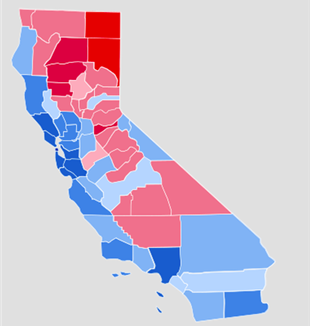
After the Surprise, a Tension Grows
A reflection and witness on the unforeseen results of the 2016 Presidential Election.The morning of November 8, the day of the presidential elections, I went to a mechanic to have my car fixed. While I got ready to pay the bill, the owner of the shop questioned me about the elections taking place. He was an immigrant from the Middle East, and was full of enthusiasm to tell me that he voted for Trump. According to him, Trump was going to change the government. He was going to put tariffs on Chinese products, and on top of that was going to throw out the illegal immigrants. And not only that, but all of his friends, all of them, had voted for Trump.
This conversation did not take place in Texas, nor in Michigan, but in California, in Silicon Valley to be precise, the technological center of the United States. In that moment, I knew that the election was going to be hard-fought, not at all an easy victory for Hillary Clinton. Nevertheless, I did not expect a victory for Trump, and for a large majority of my fellow citizens, the result of the elections was a real surprise. The metropolitan area of San Francisco is one of the most progressive places in the country, and for many people who live here, these tendencies seemed to point to an ever-greater progressivism at the national level, and therefore a victory for Hillary was obvious.
Despite what the owner of the mechanic shop said, the data shows that California voters supported Hillary Clinton overwhelmingly. Even so, they continued to be idiosyncratic. They voted, for example, to legalize the use of recreational marijuana, as well as to reaffirm the death penalty. At the Catholic parish where I go, the faithful were divided between those who voted for Clinton and those who voted for Trump. Some voted for Trump, either because they believed he was the lesser of two evils, or because they trusted in his declarations to the pro-life movement. Others supported Clinton because they wanted to see a woman in the White House, or because they were afraid of what Trump would do if he got to the White House. A good number, dissatisfied with both options, voted for third-party candidates. Everyone had their reasons, and everyone agreed that they wanted a divisive and heavy electoral campaign to be over. After the defeat of Clinton, many Catholics who voted for Trump expressed relief, because Clinton represented a continuation of the policies of the Obama administration, above all in terms of religious freedom. While others, backers of Clinton, expressed consternation that someone so crude and openly hostile to minorities and women could arrive at the most powerful position in the world.
The ideological divisions have favored a growing tension. There have been protests in places like Berkeley and Los Angeles, and on university campuses. There has also been news of violence. Both sides denounce the attacks: it seems that, for some, the election has become an excuse to let loose aggressions toward those who represent a different ideology.
The most palpable feeling, though, is uncertainty. The question that everyone shares, both those who supported Trump and those who didn’t, is if the President-elect will follow through on the declarations he made during the campaign. And nobody is more interested than the great number of Latin American immigrants, many of whom are undocumented. The majority of them have family members and friends who live in fear of being deported or otherwise subjected to the law. Many are young people: in virtue of the federal program which began in 2012, more than 700,000 undocumented adolescents provided their personal data to the government in exchange for permission to attend university and to work in the U.S. If President-elect Trump revokes or eliminates this program, these young people will remain exposed.
For the moment, nobody knows how the Trump administration will be. Some hope that he will dedicate himself to carrying out his promise to bring about real changes, while others hope that his business experience will help him make reasoned and practical decisions. Some fear a new authoritarianism and others, that everything will remain the same as before. For everyone, the election of Donald Trump to the presidency of the United States has functioned like a magnifying glass, putting the hopes and fears of each person into sharp focus. In the next weeks and months, reality will show us which of these are well founded and which are not.
Previously published in paginasDigital.es, 1 December, 2016